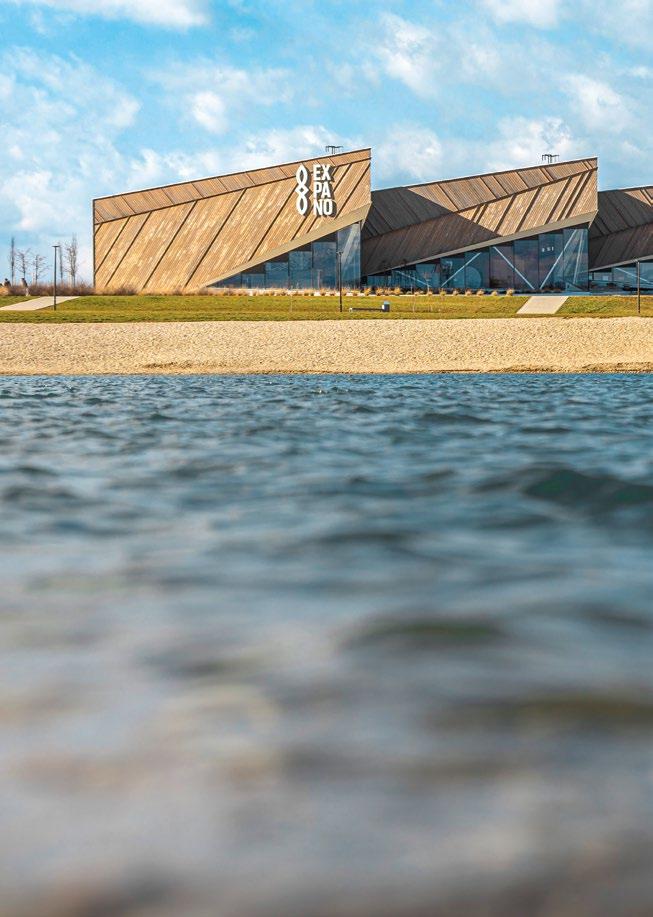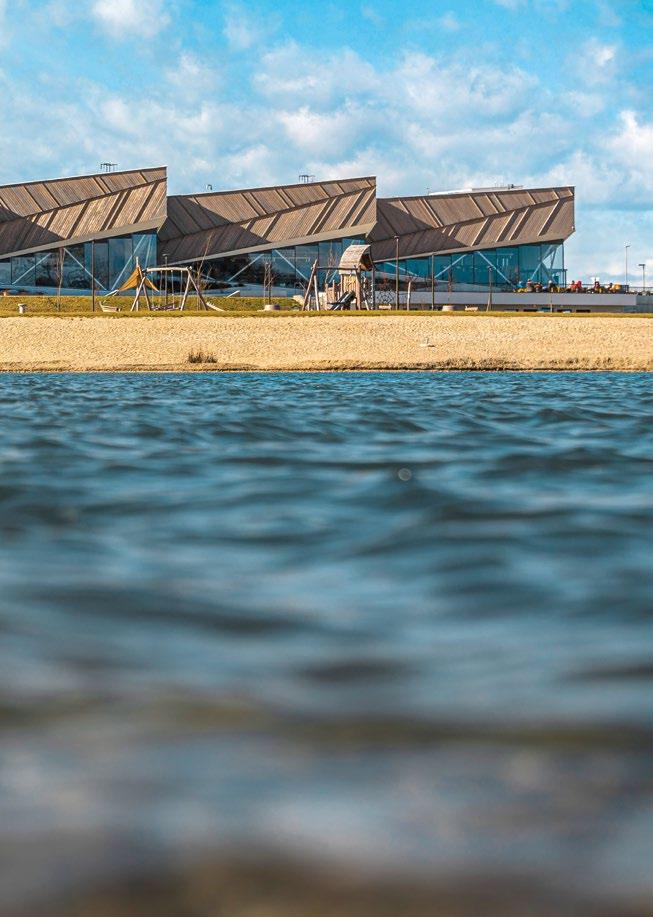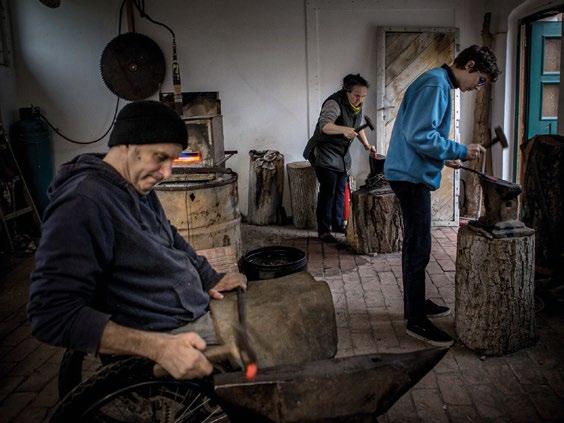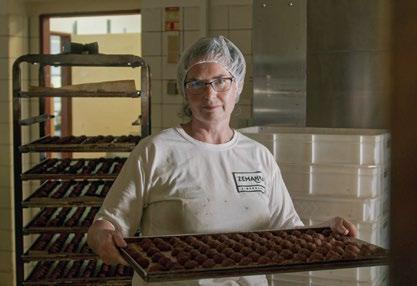
7 minute read
SMEs: the Network that Supports Our Time
SMEs: the Network that Supports Our Time
We live in times of unprecedented complexity. But amid climate change and an unstable macroeconomic scenario, small and medium-sized enterprises can show the way forward to a greener and more inclusive society. Generali supports SMEs in the sustainable transition with SME EnterPRIZE.
THE EDITORIAL OFFICE

European small and medium-sized enterprises are trying to be more sustainable and are asking for greater support from policymakers. They seek fiscal incentives to promote sustainable products and services, EU subsidies, and greater opportunities for training and acquisition of skills to help them play an active part in the green transition and overcome the obstacles that a constantly changing macroeconomic scenario poses to the adoption of sustainable business practices. These are the findings of research conducted by SDA Bocconi School of Management in collaboration with Generali for SME EnterPRIZE, the Group's initiative that promotes the culture of sustainability among the continent's small and medium-sized enterprises. The third edition of SME EnterPRIZE involved over 7,600 companies this year, from 10 European countries. The project also aims to build awareness of EU institutions and programmes dedicated to economic recovery and support for SMEs, in line with Generali's commitment to ever closer collaboration between public and private sectors for a greener and more inclusive society.
The study, the full version of which is presented in the new edition of the White Paper "Fostering Sustainability in Small and Medium-sized Enterprises" available on the website sme-enterprize.com, consulted entrepreneurs and managers of over 1,200 SMEs in 9 European countries in order to analyse the obstacles and development opportunities met by a sector of fundamental importance to the sustainable growth of our continent's economy. It is particularly relevant given the increasing frequency of extreme events linked to climate change and the consequences of a macroeconomic scenario still dominated by the effects of the Ukraine conflict, the energy crisis and inflation. In this regard, 59% of the SMEs interviewed stated that higher energy prices had a negative impact on their approach to sustainability, inflation was cited in 58% of cases, and the conflict was mentioned by 47% of the companies in the sample.

MORE SUSTAINABLE, MORE RESILIENT
However, the picture is not totally gloomy, and demonstrates the importance of the sustainable transition: SMEs that have adopted sustainability initiatives obtain improvements in the main parameters of company performance and are also more resilient to external shocks. In fact, the survey found that NextGenerationEU funding has produced positive effects for 52% of companies that have already implemented a sustainability plan, while only 20% of SMEs that have not yet implemented a plan have obtained benefits from NextGenerationEU.
SMEs that have adopted sustainability initiatives are more resilient to inflation
Furthermore, companies with the most developed sustainability plans - which include employee welfare initiatives, community engagement and environmental protection through the circular economy, energy efficiency, and decarbonisation - have proved to be more resilient in the face of inflation, rising energy prices and the war in Ukraine. Sustainability-oriented SMEs also create a better environmental impact (82%), benefit from greater customer satisfaction (75%) and a better reputation (64%).

SUSTAINABILITY HEROES
Despite the numerous challenges they face, European SMEs continue to be committed to the sustainable transition. Some have demonstrated an ability to combine sensitivity towards climate and environmental issues with social and welfare initiatives for employees and local communities through integrated models that place people at the centre. Among them are some of over 7,600 SMEs from the 10 European countries participating in SME EnterPRIZE for 2023, standing out as "Sustainability Heroes". In France, for example, La Conciergerie Solidaire promotes employability and social integration by offering concierge services to companies, neighbourhood communities and other meeting places, while Dorfplatz STAW of Austria offers co-working spaces and the chance to organise events, workshops, and cultural and social initiatives for the local community. Humana Nova, a Croatian social cooperative, offers employment opportunities to people with disabilities, involving them in the upcycling of clothing through repair and alteration, and the recovery of yarn from clothes that are no longer usable, to create new garments without resorting to virgin yarn. Another example of attention to communities and people, particularly the most vulnerable, is provided by the Spanish company Maximiliana, which has developed smartphones that are designed for use by elderly people and can be managed remotely by family members through a special app, allowing relatives to stay in touch and combat loneliness and isolation in the elderly.

However, the environment remains to the fore, with numerous small and medium-sized enterprises in every sector continuing to find new solutions aimed at Biopekárna Zemanka, a bread and cake shop in the Czech Republic that uses residual raw materials from other food production, recyclable packaging and electricity from renewable sources. Sudár Birtok, a family-run business in Hungary, also operates in the food sector, specialising in the cultivation and processing of organic spices and herbs. In Germany, Pervormance International has designed a zero-emission cooling system suitable not only for buildings and vehicles, but also for clothing, to prevent overheating for athletes, for health needs, and for workplace safety. Portuguese company Miranda Bike contributes to sustainable mobility by supplying customised components for bicycle manufacturers, using renewable electricity and recycled materials. Even in the construction field the watchword is "zero impact", and this objective is pursued in Slovenia by Lumar IG through its zero-consumption prefabricated buildings. Finally, the Italian company Planetek Italia offers solutions for the use of geospatial data while contributing to the sustainable development of the aerospace industry.
Despite current conditions of unprecedented complexity, being sustainable also means being more resilient
These are just some examples of the virtuous practices adopted by small and medium-sized European enterprises to meet today's environmental and social challenges. Despite current conditions of unprecedented complexity associated with climate change and an unstable macroeconomic scenario that is still feeling the effects of conflict, the energy crisis and inflation, small and medium-sized enterprises demonstrate that being sustainable also means being more resilient, and through their commitment and spirit of innovation show us the way forward to a greener and more inclusive society.










